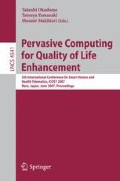Abstract
Those suffering from mild dementia exhibit impairments of memory, thought and reasoning. It has been recognised that deployment of technological solutions to address such impairments may have a major positive impact on the quality of life and can be used to help perform daily life activities hence maintaining a level of independence. In this paper we present an overview of our current investigations into how technology can be used to improve the quality of life of the ageing person with mild dementia. Specifically, we detail the methodology adopted for our work, outline results attained from a series of workshops to identify user needs and finally present how these user needs have been mapped onto the design of home based assistive technologies.
Access this chapter
Tax calculation will be finalised at checkout
Purchases are for personal use only
Preview
Unable to display preview. Download preview PDF.
References
Fratiglioni, L., Launer, L.J., Anderson, K., et al.: Incidence of dementia and major subtypes in Europe: A collaborative study of population-based cohorts. Neurol Dis. Elderly Res. Group, Neurology 54, 10–15 (2000)
Cook, D., Das, S.K.: How smart are our environments? An updated look at the state of the art. Journal of Pervasive and Mobile Computing (in press) (2007)
Holthe, T., Hage, I., Bjorneby, S.: What day is it today? Journal of Dementia Care. 7, 26–27 (1999)
Oriani, M., et al.: An electronic memory aid to support prospective memory in patients in the early stages of alzheimer’s disease: a pilot study. Aging & Mental health 7, 22–27 (2004)
Lekeu, F., Mojtasik, V., van der Linden, M., Salmon, E.: Training early Alzheimer patients to use a mobile phone. Acta. Neurol. Belg. 102, 114–121 (2002)
TeleCARE: A muli-agent telesupervision system for elderly care, http://www.uninova.pt/~telecare/
Miskelly, F.: A novel system of electronic tagging in patients with dementia and wandering. Age. and Ageing 33, 304–306 (2004)
Meiland, F.J.M., Craig, D., Molaert, F., Mulvenna, M., Nugent, C., Scully, T., Bengtsson, J., Droes, R.M.: Helping people with mild dementia navigate their day. In: Proc. ICMCC, Amsterdam (in press) (2007)
Author information
Authors and Affiliations
Editor information
Rights and permissions
Copyright information
© 2007 Springer Berlin Heidelberg
About this paper
Cite this paper
Nugent, C. et al. (2007). Home Based Assistive Technologies for People with Mild Dementia. In: Okadome, T., Yamazaki, T., Makhtari, M. (eds) Pervasive Computing for Quality of Life Enhancement. ICOST 2007. Lecture Notes in Computer Science, vol 4541. Springer, Berlin, Heidelberg. https://doi.org/10.1007/978-3-540-73035-4_7
Download citation
DOI: https://doi.org/10.1007/978-3-540-73035-4_7
Publisher Name: Springer, Berlin, Heidelberg
Print ISBN: 978-3-540-73034-7
Online ISBN: 978-3-540-73035-4
eBook Packages: Computer ScienceComputer Science (R0)

